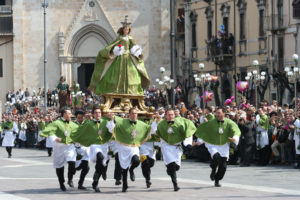I had the privilege of seeing George Weigel, Pope John Paul II’s personal biographer not long after the Polish Pope was beatified. I’ve spent the last couple weeks reading Weigl’s Witness to Hope which documents the Pontiff’s life and it’s been crazy. Crazy in a good way. It’s packed with history, theology, philosophy, letters and memories. I thought I’d share some of the most stricking passages so far. I’m hoping this will make you read it too. As you know, before he was Pope John Paul II his name was Karol Wojtyla.
A letter he sent to Teresa Heydel, a young lady in his young adult group:
Dear Teresa,
People like to think that Wujek [One of Karol’s nicknames, meaning “Uncle”] would like to see everyone married. But I think this is a false picture. The most important problem is really something else. Everyone… lives, above all, for love. The ability to love authentically, not great intellectual capacity, constitutes the deepest part of a personality. It is no accident that the greatest commandment is to love. Authentic love leads us outside ourselves to affirming others: devoting oneself to the cause of man, to people, and, above all to, to God. Marriage makes sense…if it gives one the opportunity for such love, if it evokes the ability and necessity of such loving, if it draws one out of the shell of individualism (various kinds) and egocentricism. It is not enough simply to want to accept such love. One must know how to give it, and it’s often not ready to be received. Many times it’s necessary to help it to be formed… Wujek
~~~~~~~~~~~~~~~~~~~~~~~~~~
“ He [Karol] never had a bank account, never wrote a check, never had any personal money. He slept on the floor and practiced other forms of self-discipline and self-denial. Possessions meant nothing to him, with the possible exception of the skiing and hiking equipment he accepted from his Srodowisko friends… He always wore and old cassock and old shoes. Looking at him, Malinski remembers, you might think he was a beggar, a clochard a nobody.”
~~~~~~~~~~~~~~~~~~~~~~~~~~
“These were men [four professors at the Catholic University of Dublin, including Karol] who believed that ideas were not intellectual’s toys. Ideas had consequences, for good and for ill. The history of the twentieth century’s various torments, proved that defective understandings of the human person, human community and human destiny were responsible for mountains of corpses and oceans of blood. If they could help the world get a firmer purchase on the truth of the human condition, in away that was distinctively modern and grounded in the great philosophical tradition of the West, the future might be different.”
~
Fabiola Garza writes and draws @ http://catholiccolors.com




